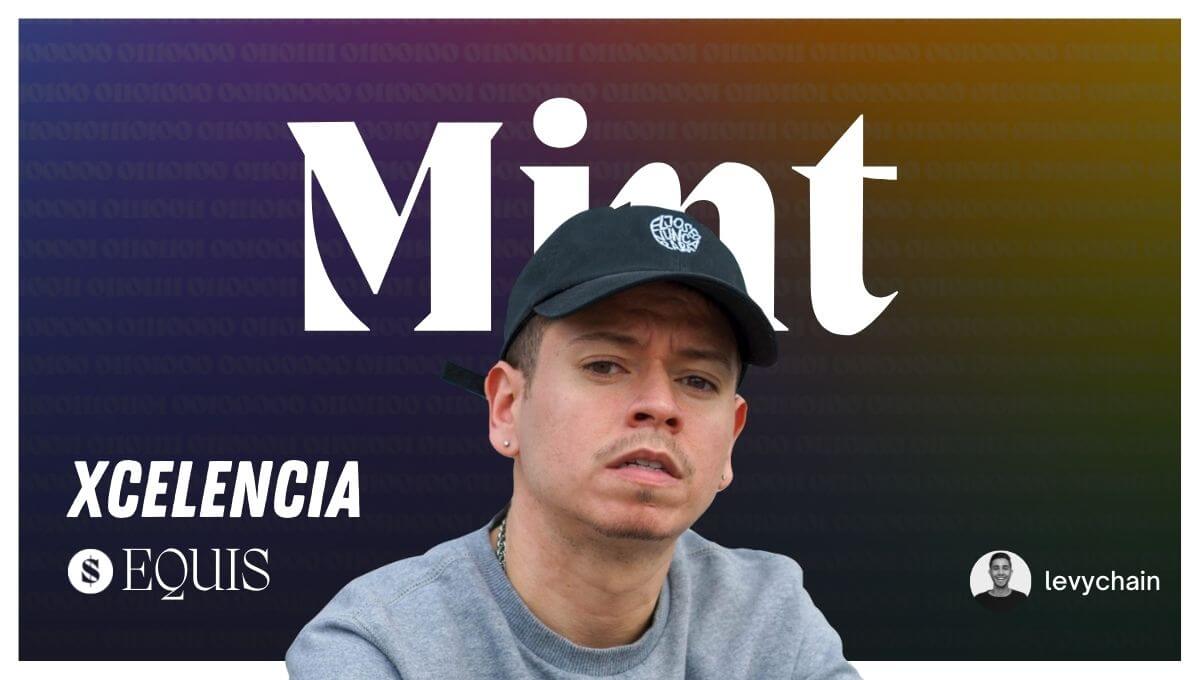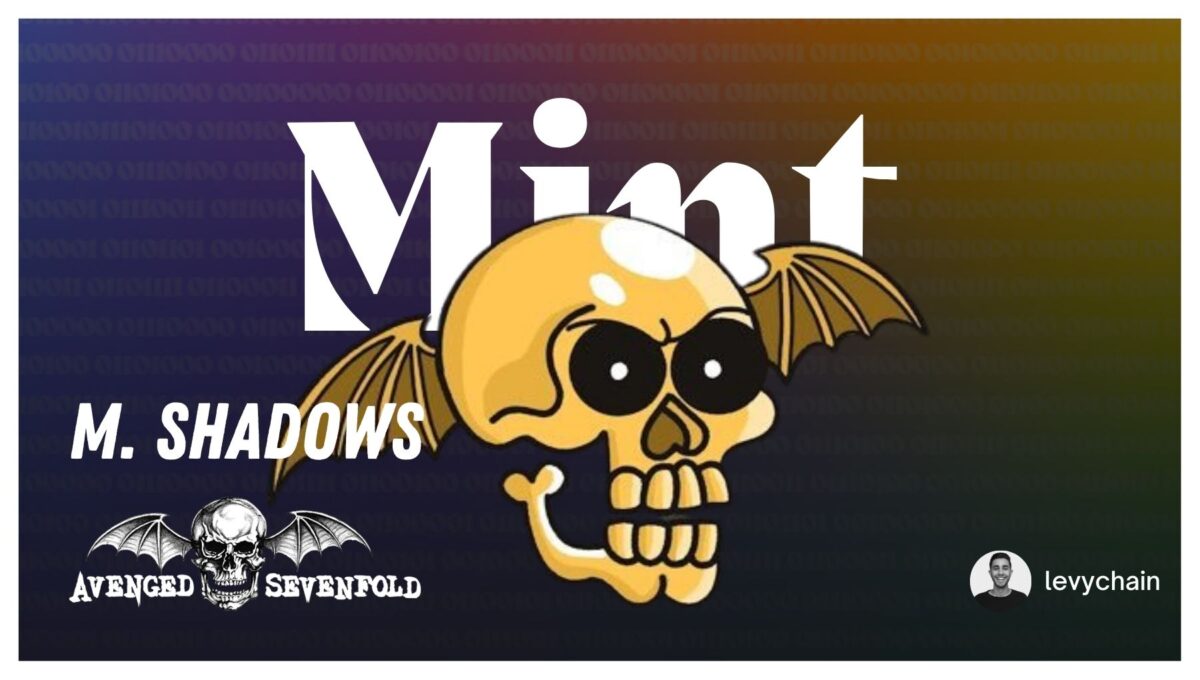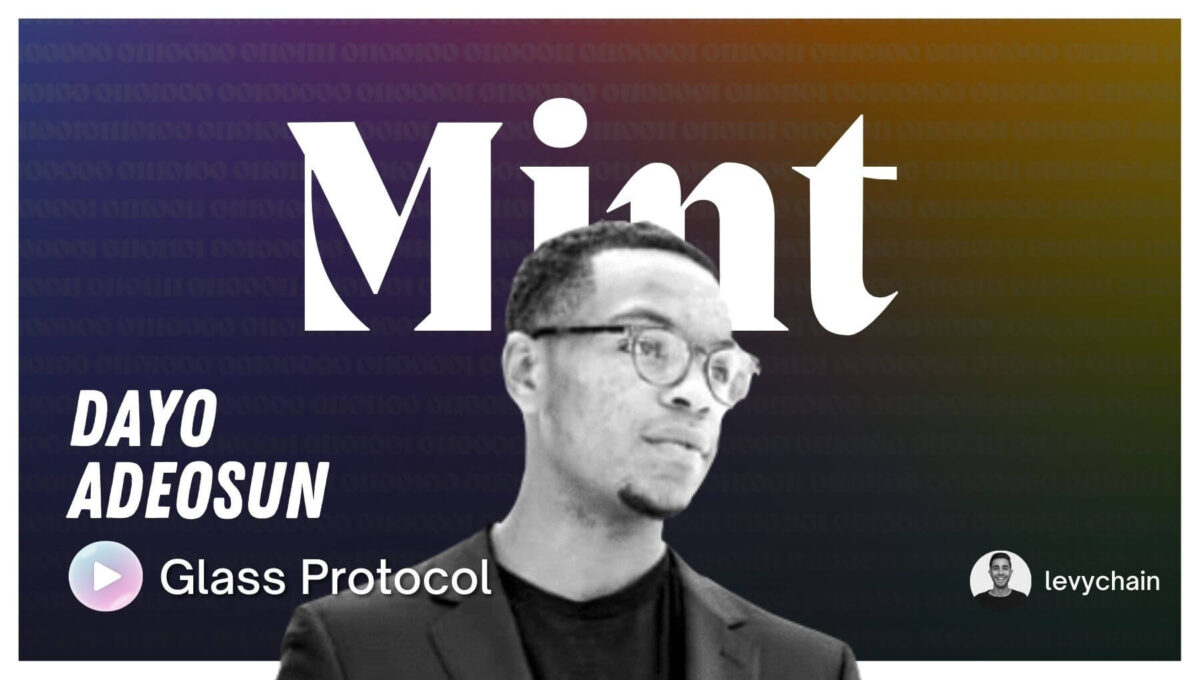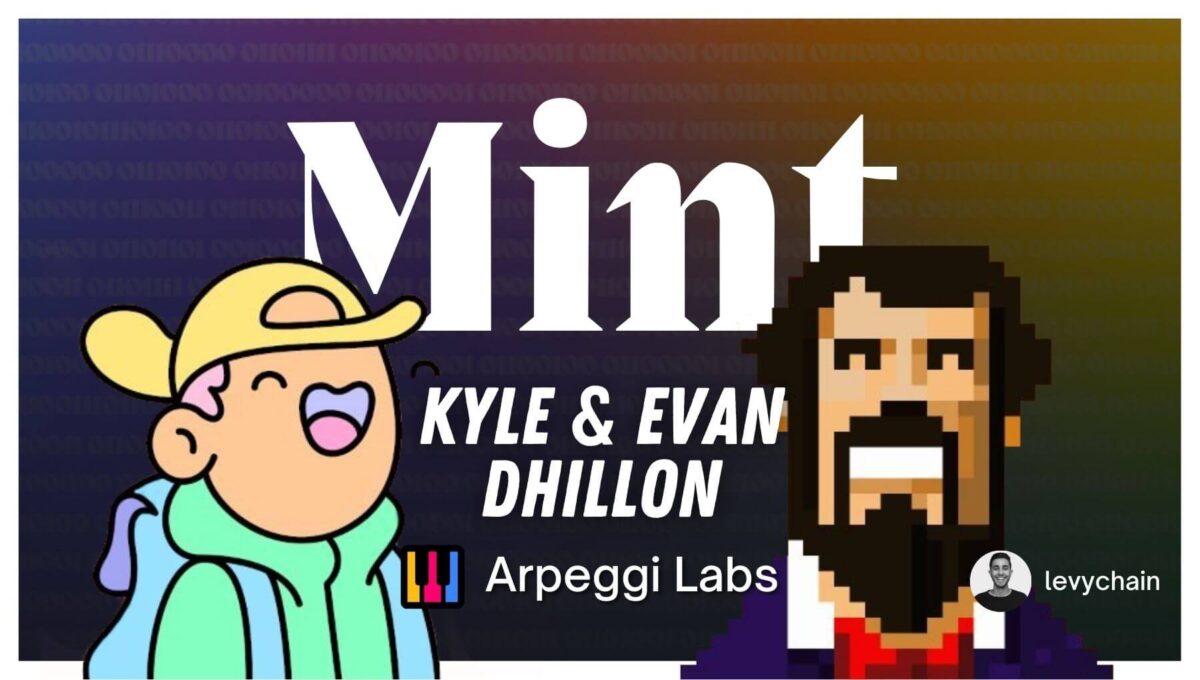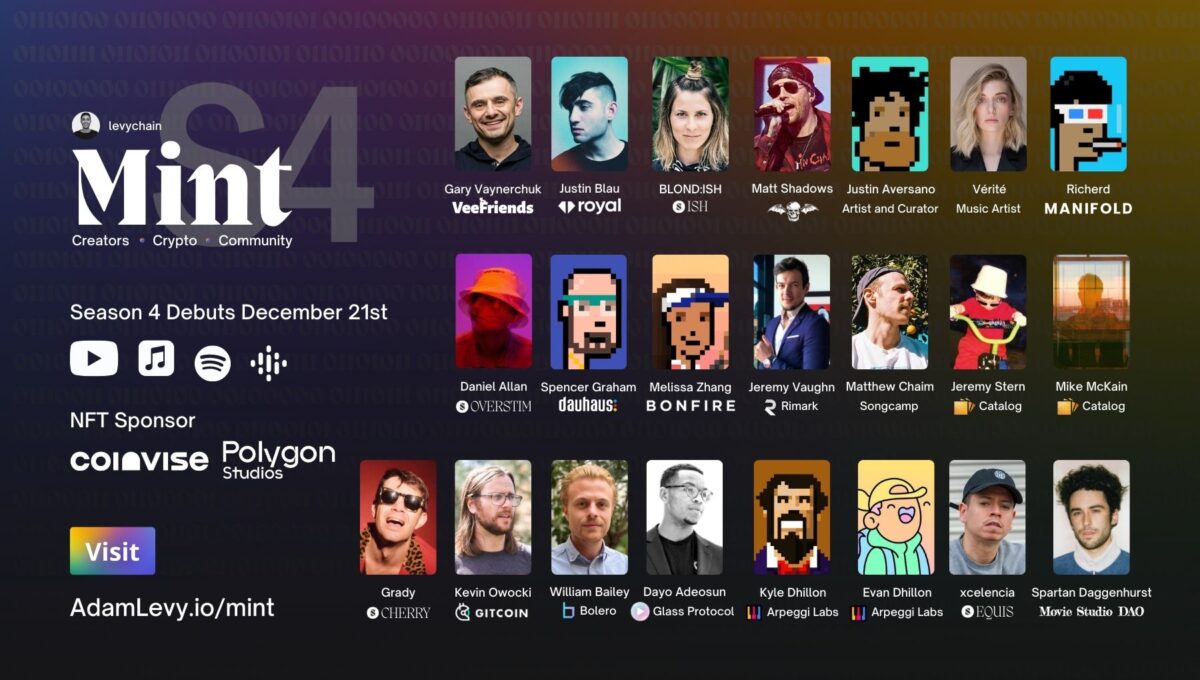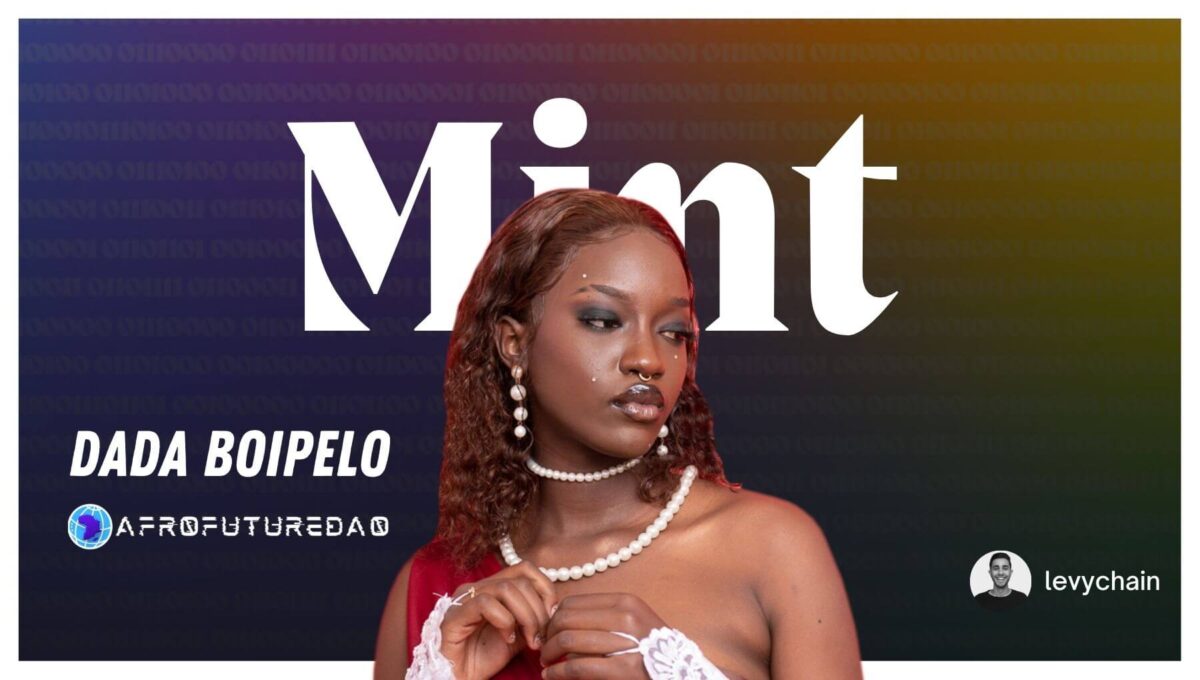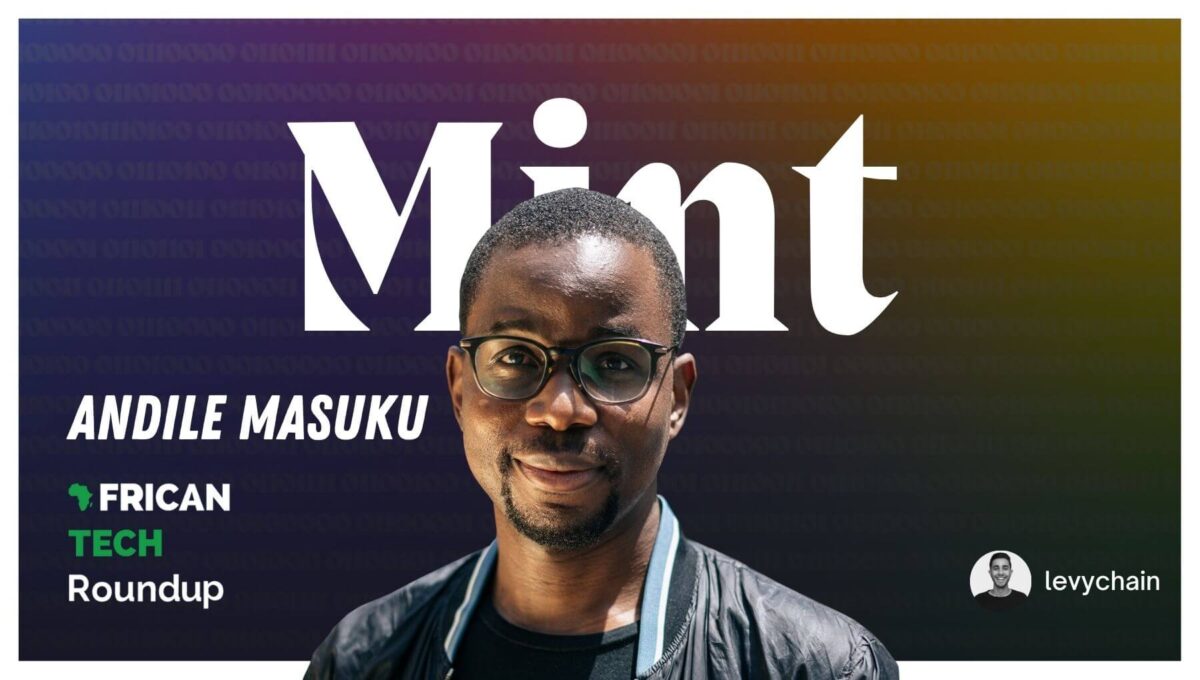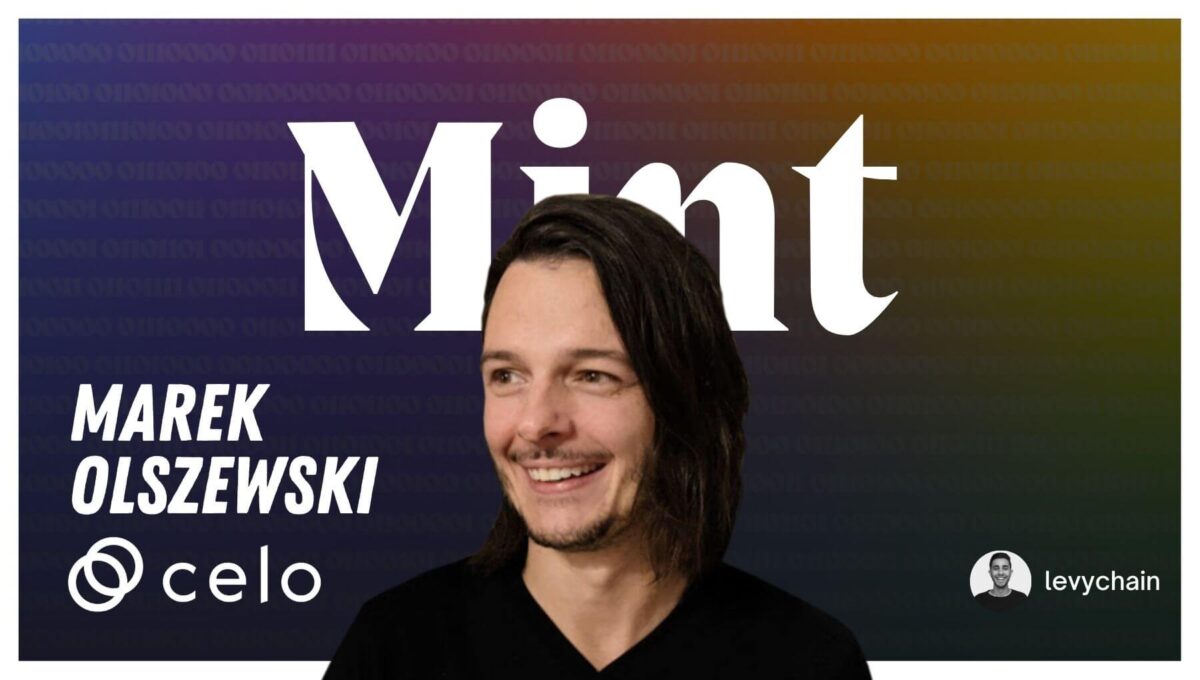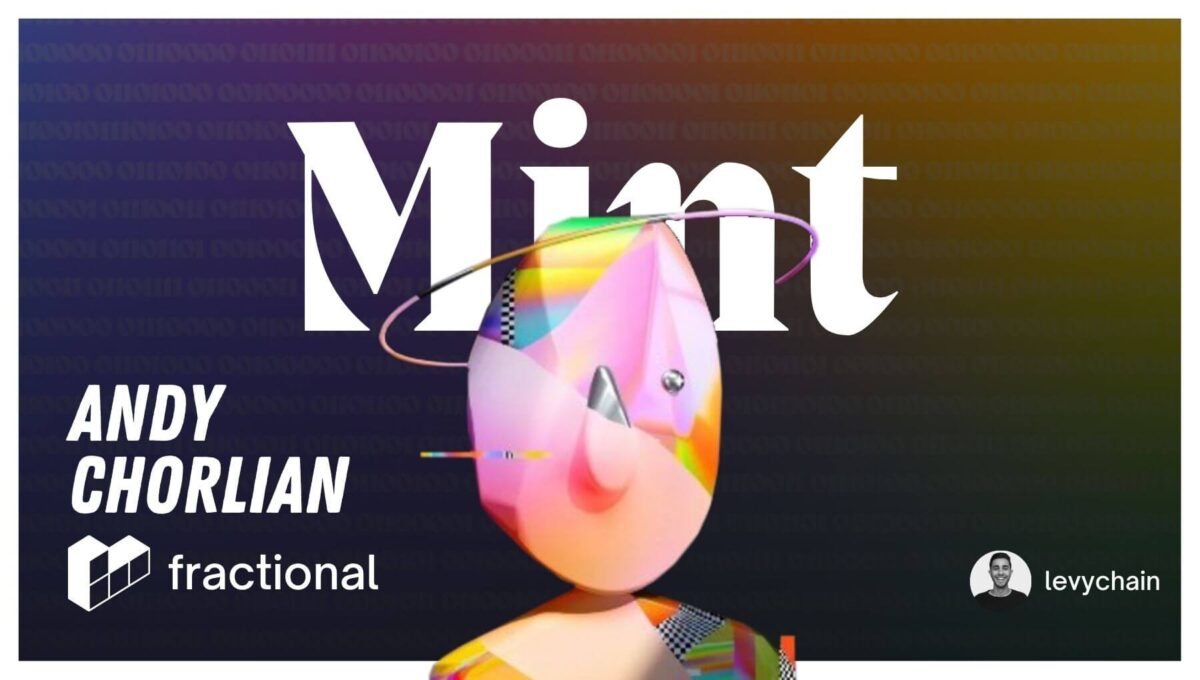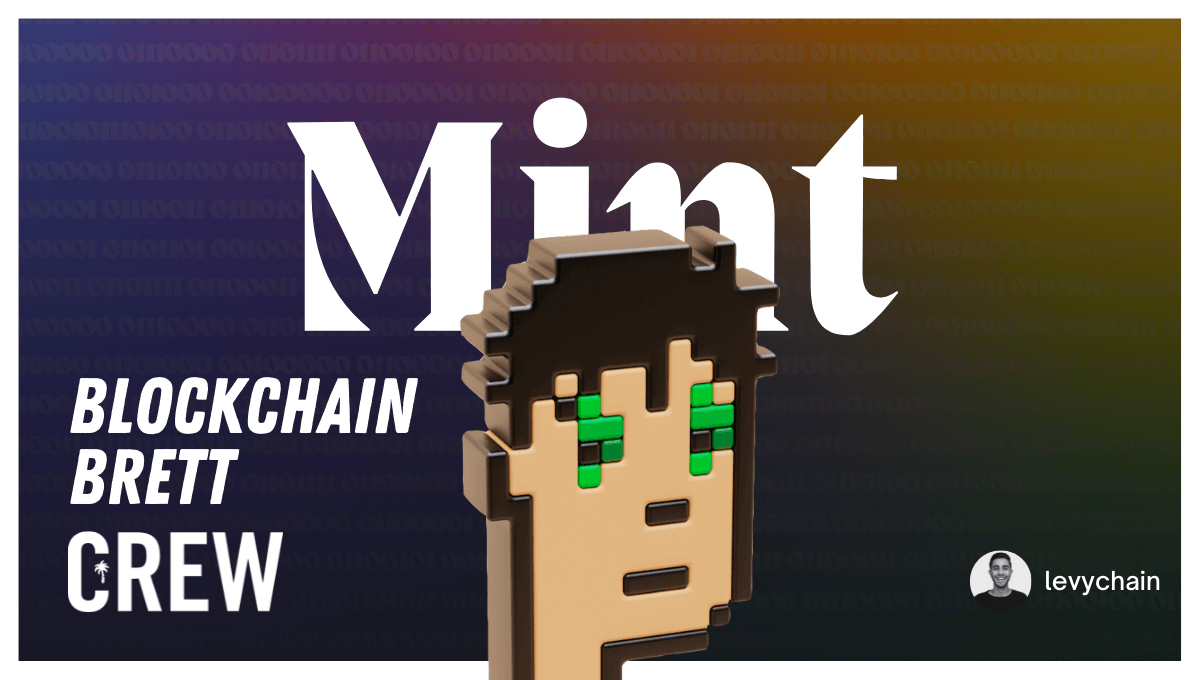Listen on: Spotify | Apple Music | Google Podcast
Background
Mint Season 4 episode 4 welcomes Xcelencia, a Puerto Rican songwriter and musician who growth hacked his way through Spotify playlists and now has landed in the world of web3. He’s the creator of the social token $EQUIS and more recently launched a crowdfunding campaign on mirror to bootstrap the birth of Infinite, an immersive multimedia album and digital art experience that will grow in real-time as fans engage with the project.
In this episode, we discuss:
- 00:39 – Intro
- 03:45 – Playlist Building
- 07:50 – Social Tokens
- 13:47 – How to Incentivize your Community?
- 24:48 – Labels and Investors- How do they fit in?
- 28:29 – Two Tokens – What’s the difference?
- 34:01- How do you see the future?
- 26:31- Outro
…and so much more.
Support Season 4’s NFT sponsors!
1. Coinvise – https://coinvise.co
2. Polygon Studios – https://polygonstudios.com
Interested in becoming an NFT sponsor? Get in touch here!
Xcelencia welcome to mint, my friend. How are you doing? Thank you for being on.
Good. Good. Thank you for having me. I’m excited. My first crypto NFT podcast. So super dope to be here.
Intro
Let’s go. Yeah, man. Thank you. Thank you for taking the time. I’m excited to have you on. I’m excited to feature you on season four. I’ve been watching you enter the web three space and mess around and throw all these crowd funds. How you doing? How does it feel? Welcome to web three. I know you just transitioned in, right. And which is also primarily why I wanted to have you on yeah man, how’s it going?
It’s amazing. I mean, the support that I got, like, by the way, like earlier this year I launched my social token through Rally. Then I’ve sold a few NFTs. One of ones on catalog works and it all basically aligned towards me putting out this crowd fund, which I’ve been exploring for some time now. Like it’s been living in my head for a while, I wanna say since 2018. So I’ve been wanting to crowd-fund through crypto through blockchain for that long. So I kind of like naturally transitioned, like I gravitated to it cause I’ve been in crypto since early 2017. So I’m new as a creator in the space, which by the way, I didn’t expect like any kind of success or support as a creator. In my mind, I thought like, maybe I can invest in crypto and that I can take from that and invest in my career, kind of keep self-funding my career throughout the years. But I made the transition like late last year and I’ve just been putting in the work to get to a place where like people can kind of see how I’m navigating and I’m trying to bring something new to the space.
I see it, I think, well, you’re the first Latin artist that I’ve supported that I’ve seen come across my feed that has like, we’ve engaged with different chats. But I guess before even we even go into rally, before we go into mirror, before we go into the crowd-fund, before we do any of that web three talk, who are you like, what does the world need to, about Xcelencia and explain your music to us as well and how you kind of got started in crypto.
Yeah. So I’ve been in the music industry for about 10 years now. I started off as a songwriter. I then started diving into more like the production side of things. I actually like, so I dropped outta high school. I still got my diploma and I went to school for audio engineering. So basically I grabbed from a little bit of everything, the writing, the production, the engineering and I decided like music is my passion. This is what I really want to do. I want be an artist. And I started making my own music. So basically fully on like self sufficient. Like I’m here in my studio, it’s been like this since day one. So I’ve been super active, super consistent for just about that amount of time? So it’s been a few years of kind of hustling on the independent side, like in the Latin music. Like there’s not that wave of like, I’m independent, I’m doing this, it’s part of my brand? So it means a lot to me to kind of maintain ownership. And I really believe in independence. Right. I’ve been doing it for, for that long now, it wasn’t until like 2017 where I really saw the change because happened was like, I saw what was happening in Spotify and how Reggaeton and Latin music was really exploding because of the playlist. So I decided to put out an album where it was basically like a playlist of different music, but I released it on a weekly basis. So I started dropping a song every Friday and things started to really pick up for me. So from there on, I just kept up with that consistency and that’s when my career really started to kind of take off to a certain extent.
Playlist Building
Oh. I didn’t know that about you. That’s pretty cool. So you kind of like growth hacked a lot of the playlist era quote, unquote, to kind of bring your career to life. Okay, cool. Interesting. What was that like? What was that like building playlist? How’d you get listeners to that? Like, I know nothing about that world. So what did that look like? How did you bring that to life?
Right. So it was 2016. I remember I was going through my numbers and I got a check for like a couple hundred dollars and I was like, wait, like what’s happening here from the distributor. And what I noticed was that I got placed on a playlist out in like Chile, it was like a Reggaeton playlist. So it was like the top 100 Reggaeton songs of the moment. And somebody featured me on there. So I was like, okay, I started taking notice, but that was 2016 before it really kind of took off. And then that’s when I decided on that strategy of like, okay, let me, I’ve always like tried to reimagine distribution, right? Like, I’m like, how am I gonna stick out? There’s a lot of noise. A lot of people are putting out music like every week? So that was my way of saying like, okay, I’m here to stay. And I’m here to put out, great music. So that’s kind of how I kind of leveraged that. And I built the playlist up and it was cool because it was like, it was like my website at the time where it was a place where everyone can just go and just listen to my music. So that’s kind of how I treated it. So instead of promoting the individual songs, I promoted the playlist. So I was able to get followers and get more placements and pushing to get the music heard all around
Okay. Got it. Yeah. That’s super cool. So when did you actually get into web three as a creator? Like what was that period? Yeah,
So I would say, I always say like, so I got into crypto, like early 2017. I saw what Ujo music was trying to do at the time. And I thought that was interesting, but I didn’t see it as like something that would benefit me as like a Latin artist. Like I just didn’t see a lot of the music was like instrumental or like electronic music, which is super dope. I follow that movement a lot. So then I kind of just kept researching. I kept learning. I kept seeing what was happening on Ethereum. That was like the ICO era, of course. And then I saw Grammatic, he did a fundraise on a platform and he was able to raise money to put out, I think his next album, or just fund his tour, just something along those lines. And I thought that was interesting, but I told myself like, what, right now is not the time. So let me see if I can just stay on this for a few years. I was already, like, my conviction was in crypto was like super high by then. So like I said, let me wait and let me see what happens. I always told myself 2022, 2022, which was five years from there. So I’m like, let me give myself five years, stay, stay involved, stay active, which I kept it really low key. Like if you go back on Twitter, you’ll find like some crypto tweets, but like I had like a separate account for crypto. I would like follow VCs and traders and like the projects. And that’s how I kind of stayed on top of everything. I was part of Audius like 2019. So I would say maybe kind of when I started that, , I was following them when I think they had like two tokens, it was audio and loud, and then they kind of transitioned this audio and that’s kind of how I started, like my creator. I understood streaming so well that Audius just, it clicked for me like right away. Yeah,
Yeah, yeah. Makes a lot of sense. So then that brings us I guess to what you’re doing right now. Okay. Which is what I wanna primarily talk about. So you have your own social token. It’s called what $EQUIS, if I’m pronouncing it correct?
X in Spanish.
Social Tokens
Okay, cool. That shows you how illiterate I am when it comes to that, but all good. All good. Okay. And it’s on rally coin. Okay. On the rally platform and you also have this new social token that you’re putting out via mirror. Okay. Let’s talk about rally for a minute. Talk to me about the journey of becoming like a rally creator, but more importantly, like the process of issuing your first social token, what did that look like? What did that feel like? Tell me about that journey.
Yeah. So I definitely took my time because I, I found out about rally like last summer. I used to follow a lot of like the VC websites and stuff to see like where the smart money was going. Like, what were they involved in? And I saw it on the Coin-base venture site. So I clicked on it. I’m like, what is this? It says something along the lines of creators. So it resonated with me. So I started researching rally like deep. This was even before the network launch. So like, I think I cold emailed them like maybe when they launched or around the time they launched, which was like October. And they put out the ROI token, they launched the platform and I started really researching, but I didn’t actually launch until April of this year, 2021. So it was for like, from October to April, I was doing my research. Just kind of figuring it all out. I got approved on another platform, but I went with Rally because like the on-boarding process was, to me it was super like personal. It didn’t feel like, it just felt real, right. Like I had to meet with them, it was email. But then we had a video call, they on-boarded me, they told me the process, the flow of everything. So I decided to go with them because I saw that there was a strong community there and just the on-boarding flow of it was, was great. And it was really fast, , like they issued the token within a few days, I had my profile, I had everything set up. It happened right away. It was like around April or May that I launched, which at the time, the market actually took the dive at the same time that I like. So that was interesting too.
How how’d you get your first few holders? Like how’d you get the first few Xcelencia fans buying the token, holding the token and then eventually building some type of utility around it.
For sure. So I put a lot of thought into like the use cases, the utility. And I found that like, if I focused on my super fans and the fact that a lot of them are out in Latin America and like different like emerging markets and things like that, people that don’t have prior crypto experience, I thought like this was a more familiar experience. Like you sign up, you create an account, you have a username and ID and I can airdrop the token. And so I started by air dropping. So I never promoted, like buy the token or the sale of the token or anything like that, it was more like, do you wanna be a part of this? Get access to my discord. Discord didn’t move the needle for me at first. So I pivoted to WhatsApp, so I bought a new phone.
Interesting. Wait, can we hold on that for a minute? Why did you think discord worked for you?
So I don’t wanna generalize, but I think that like WhatsApp in Latin America is like the top like messaging platform. So like for example, all the producers I work with whether they’re from Columbia, Chile where else? Argentina, which is like one of my, my big users that I work with, they use WhatsApp. That’s how they communicate with family friends. So I had that idea in mind of like, okay, if I build a community, I can use a WhatsApp group. So it’s like a WhatsApp business. So I decided to like focus on, so I have both the discord and the WhatsApp group and I use those two to kind of communicate.
Got it. Okay. You were saying continue before.
So I got them in with like, airdrops I got in my collaborators, like my close team, the people that like, I trust, I brought those in first and then over time I started like just really building up and showing that like, Hey, I didn’t just do a token just to do it. Like, I’ve been looking into this for some time. I believe in it. I know it’s gonna take me some time to grow it. But I, think that like in rally, like a lot of people took note and they, kind of gave me that like vote of confidence and they started becoming a part of like what I’m trying to do, whether it was through supporting and holding my coin or just kind of like, just connecting with them. Right. Like I never really tell anyone like, Hey, buy the coin or anything, but I always say like, if you want, some I can airdrop you some. I can send you some [inaudible] ?
Yeah. Why do you believe in social token so much? You said, I believe in this, like, why do you believe in this medium as a form to kind of build a community? What does that mean to you? Yeah,
So one of my first startup ideas was basically like building a community through like SMS. Right. So at the time, I didn’t think there was anything like that until like community actually launched their app and like super phone, things like that. And I felt like social media was gonna get saturated. So I was thinking that fans, or people would like to connect on a more intimate level with their favorite artists or celebrity or whatever it may be. So like, that was a few years before even social tokens were a thing. So like that to me was just like, I gravitated towards that. I was like, this is a way of like, instead of like having a Patreon where someone pays monthly, now they can kinda like, be a part of the value that I’m creating over time. So like a, a single transaction and it’s like a one way thing, it’s a bilateral thing, right. Where, like you’re kind of part of my success as well. Anyone that contribute I do bounties, I do rewards. I do airdrops you share my song on your Instagram stories and you can earn some of the [inaudible and then you’re free to do with it, whatever you wanna do with it. I do believe in it. I was looking to build a fan club for some time, but it was either like a Facebook group or a Patreon. I’m passionate about crypto. I can have my social token. I can build it out this way. It’s gonna take some time, but I’m gonna go for it. And that’s kind of where my thought process was at the time.
How to Incentivize your Community?
Makes, makes sense. Can you talk to me more about like the utility framework you use to kind of build value beyond the monetary value value for your holders and how to incentivize them to actually buy your first social token on rally? You mentioned Instagram stuff, you mentioned a WhatsApp group Chat, talk, talk more about that.
I think that’s what I’m excited about. Like, I think bounces and like, I don’t wanna call ’em tasks, but like, for some people it could be like, it could be a collaborator or like, they, they create some content for me and I can like, give them some coin for that? And then they can also earn ROI because of the way that rally incentivizes holders on the platform. So that just adds, a cherry on top to them supporting me. They could also earn ROI, which, it takes like a little bit of education to kind of let people know like how it really works. If it’s a small group, you can kind of communicate that a little better. So I I’m, I’m excited about Bouncies. I’m excited about, I wanna throw a showcase here in my city. Like I mentioned, in the $INFINXTE crowd fund. And part of that is like, I wanna do tickets through Ecky. So I wanna do like a campaign, you pay the ticket in Ecky of using something like Event-Brite. So that’s, I think that’s a good way of like, saying like, Hey, like that can bring value to the token, I’m doing like that token gating thing where like, you gotta hold X amount of Eckies to be a part of the show, whether you have your own section, like the V I P section or whatever it may be. So I’m excited about trying that out as well.
Yeah. Makes a lot of sense. One thing that I think creators have a hard time figuring out is like how to get started. How do you jump first into web three and more specifically, how do you do it in a way where off the bat, you can build an audience off the bat. You can build a community and use your existing platform, like on web two to onboard some of those users from social media, web two into token gated, discord web three, right. Which I consider web three. Web three is a whole other beast. Right. But like, that’s like one of the components of web three, right? Token gating communities. How did you get your start? Like, how did you overcome those hurdles? Like, how did you kind of like find it in you to kind of be like, okay, I get it. This is the first step. Like, how did you make that transition? What I mean? Cause I feel like a lot of creators have that issue of doing that. It’s something that a lot of people talk about on Twitter. It’s a lot of things that sometimes like creators come and tell me’s like, yo, how do I get started? And you’ve seem to figured it out.
Yeah. I think it goes back to just like let’s say you’re a creator musician. Like you gotta think about like, you’re active like community at that moment, as well as like your art, whether it’s music or you’re an artist, like I think it goes down to fundamentals. Like you go down to that foundation, the fundamentals, and if you have like amazing art or music or whatever it is, that’s like what you wanna focus on. So like don’t let like web three and everything that’s happening. Kind of distract you from being in the studio and creating and making music. That’s what I did in the summer. Like in the summer, if you notice, I didn’t do a lot of minting, but I was doing a lot of researching and I was still working on making music and things like that. I said, okay, I need to focus on what’s important. And what’s going to actually build my community, my audience and give me kind of like that validation and say like, he’s actually about it. Not going off just to hype, like he’s actively working and trying to do that. So I still to this day, I still have resistance where I kind of hesitate to do certain things. I’m still on that like who’s gonna support this. I’m the only Latin, Reggaeton artist kind of doing this. I still feel that way. Like even with the crowd-fund, like I said, it in a tweet like before I actually like tweeted all, I like stepped back for a second and I was like, am I gonna really do this? Like if I do this, like there’s no going back. Yeah. And that’s what I did, man. I just went through it. But I’ve always been I’m optimistic. And I’m like super active. Like one of my phrases is the hustle never stops in Spanish and, and been like that for the last few years. So to me it was like, I wanna make this happen. I get a lot out of it. And again, going back to me being in crypto since 2017, I think that helped a lot? So that put me at an advantage where like, maybe I’m not the creator with the most sales or the most mints, but like the transition was easy. I had my meta mask, I was already using Eth I used a lot of different D five protocols, tokens. Like I’ve done a lot of research and, and I think that’s a part of it. It’s like kind of take some time out to, to learn the space, like just get involved, get active, get involved and keep going.
Yeah, one thing that comes to mind as you’re talking about research, getting involved, the example that I like to use, that I keep like remembering when I have Daniel Allen on if you’re not familiar with Daniel Allen, for anyone who’s not listening, go check out the episode with Daniel Allen. He’s also gonna be featured on season four, talking about other stuff. But one thing that he did that was very different than many, many others was before he tried to sell or before he tried to build a community around himself or anything like that, he got involved with other communities and embedded himself in all these different groups online ecosystems via discord, telegram, Twitter, et cetera, and got his name known amongst different people. Right? Yeah. Whether it be collectors, other creators moderators, et cetera, et cetera, and built up his name, his friendship, his relationship. I think it was like for six months before he even did anything. Right. Yeah. Before he even decided, like, I remember he was telling me in the beginning, I was like, I was ready to go. I had everything up front ready to go to start the campaign. But I actually took two steps back. Right. I was like, wait a minute. Like, how am I gonna get people to recognize me? How am I gonna get this thing known? How am I gonna get my name out there, et cetera. He took a very like grassroots approach that was right. To kind of like bring this thing to life. So very, very similar.
That’s a lot of like independent artists. Like I feel like a lot of us are like, what they call the bedroom producer artists. It’s DIY it’s grassroots. Like we’re bootstrapping. We’re like self-funding. So I feel like you bring that attitude and that hustle from web two over to web three, and it’s gonna work for you, as long as it’s genuine, and it’s like organic, you wanna make sure that, you’re real and you you’re doing it because you want to, and not for the sake of doing it or because you’re seeing other people doing it.
Let’s talk about this mirror campaign. Okay. $INFINXTE by Xcelencia. Up until the date right now, it’s December 27th, 4:02 PM. Pacific time you have raised 8.39 E on mirror funding goals. 15 E that converts to right now 33 K with a max or with a goal of 60 K congrats. First of all, let’s no joke. Right? I know like numbers can be desensitized in crypto and like 30 K is not a lot, but that’s a lot of money. So congrats on that for starters.
And thank you for being a part of it, man. I told you before, but like, I didn’t know Adam, before I launched a crowd-fund, I think I was following him and just kind of paying attention, that’s another thing I like about the space is just like, everyone’s like genuinely involved and they wanna see where this can go. So thank you.
Yeah, dude, I back things and support things that excite me in that I’m like the guy on the side, like cheering for you right now. Like, let’s go, let’s go. But I wanna talk more about this. All right. I want to talk about this and what you’re trying to achieve here, because what this will essentially do this will give you two social tokens now to your name. Which for new creators, for new people and existing creators, it’d be like, wait yes, two different tokens. What does one do? What does the other do? But before we get into that, I think an important piece. What is $INFINXTE? What are you trying to achieve? Why did you issue this? Walk me through that.
Yeah. So kind of going back to what I said earlier, how, I kind of locked myself in summer and decided to work on my next album. So like usually when I’m making an album, like throughout the process, I’m also coming up with like, how am I gonna put this out to the world? How am I gonna brand the aesthetic, the cover art, the music videos that’s all running through my head as I create. So I had the idea for like maybe since last year I had an idea of like, okay, I wanna put out an album, but as a series of singles with NFTs and focus a lot on the artwork side of it. So like, whether it’s like the, the cover art or like the motion art or how we’re gonna actually put it out. Like I wanted to work with a variety of different like artists and not just musicians, but like also like the digital artists and motion directors and things like that to come up with the idea and the ideas that for the entire album and all the songs to lead into this showcase where it’s like a live performance showcase, but it’s also gonna be like a exhibition style where, the NFTs are gonna be displayed in real time and people can kind of experience both sides. So the music through the performance, but also like the NFTs and what we’re doing through, the, the actual art being displayed. I wanna try to make it like an installation, something immersive where people can be a part of it. So that idea has been in my head for a long time. So I said, okay, now’s the time to do it. I feel ready. And that’s kind of where the inspiration behind $INFINXTE started.
Got it. Got it. So how has it been so far? So how long has the campaign been out for what has the feedback been have you made changes since you launched? Walk me, me through that process.
It’s been awesome, man. I came in with no expectations. Like I told myself, like if [inaudible] is not a success, like $INFINXTEs still gonna come out. Like, yeah, obviously I have to like self fund and like really hustle to get it. I’m still gonna do all of that. But like, , I was already kind of thinking like, okay, what’s gonna happen if it’s not a success. So far we, I think I launched it. I wanna say second week of December, first week we raised seven Eth. So now I’m like, okay, this is getting real and I’m not taking it lightly because it’s something I’ve been wanting to do for some time. And I know, I know where I can deliver and that’s another reason, if you notice, it’s like, it may be a lot at first, but I’ve never told my story in this detail and kind of, I added a little bit of everything that I’ve been wanting to do over the years. If I had the opportunity, the difference is if I would’ve pitched this to a label, they would’ve been like we wanna move faster than this. We wanna to put out some singles with remixes collaborations, put out the album, do a couple shows, see what happens and then move on? But like this one’s a little more like, I’m taking my time and I’m gonna put a lot of effort into like the entire experience. So it it’s been great.
Labels and Investors – How do they fit in?
Do you think labels will start valuing this creative and hustle process more than the current process that they look for in an emerging artist? Do you think at some point buying into the assets of creators will likely become a thing and like people, like you will actually be the target for like investment collaboration, right. Building around, et cetera, and using all the resources to do so. Do you see a world where that happens?
I think it could happen especially to the second part of like, I don’t know if they’re gonna use this strategy for their releases just because they move at a different pace. I think they’re gonna be looking into different ways of like engaging or community building for an artist, as opposed to saying like, Hey, put the album out and like we’ll spend this much on marketing and push it out and see what happens, get a ROI on it. Like that’s kind of like the main, putting out multiple singles doing this big exhibition, performance showcase, they do similar things like a release party, stuff like that, but I kind of wanna make it more immersive and obviously, putting out the NFTs, integrating tokens within the entire experience is all.
I ask you that question because, so when I had blockchain bread on when I had Latasha and I think also an episode that’s gonna be released soon with M shadows from Event sevenfold, we talked about this concept of record labels becoming and transitioning into creative hedge funds. And as more and more independent, like the thesis is that as more and more independent artists transition into web three, whatever that means. Whether they be independent or dependent now going independent, right? Like we see like with disclosure they’re gonna be basically purchasing the assets, the social tokens, the NFTs of these musicians of these creators as a way to kind of they’ll realize that actually creators won’t be, musicians won’t be accepting these like crazy contracts. They’ll have to start like buying into the work of the creator rather than owning the person as the creator. So I guess that’s where that comes from. Like, do you think, like, yeah, to play on that thought to play on that answer right now that you have more context, do you think it might emerge and evolve into that?
I think I shared it today with a few people. There’s an article and it’s like, labels are turning into DCs even if they don’t wanna. So like back then, it was like, labels are basically, big banks, they’re too big to fail. Now the ideas like they’re transitioning into VCs because there are so many platforms available for independent artists that over time in the artist, whether they wet three or not, they’re gonna transition into a different, like, they have a different mental model. Like you can distribute on your own and get a hundred percent of that revenue. And then you can delegate and basically find the team or the people you need to get to the next level without having to sign your rights away, you can still partner up, do joint ventures, profit splits and things like that. But I think there’s a lot of platforms that you can use to your advantage and not have to give your rights away? And I think they know that. But I can see that, that would be interesting. I thought about it a lot. I’m like, what if a label came in and, with an anonymous [inaudible] and just started buying a ton of like NFTs.
I wonder if it’s probably even happening right now. Likely.
Yeah, yeah, yeah. It’s probably happening. I thought about that a lot? So who knows?
Two Tokens- What’s the difference?
Interesting. Yeah. Well, we’ll see. So let’s talk about this concept of like two social tokens. Okay. $INFINXTE with an X. Okay. And then there’s also the one on rally. Okay. How do you think about the two? How do you think about community? Do you think about community building the same way for both tokens? How do you think about value accruation? Like it’s probably not even a word value accrual. One is already hard enough. Two is like a whole other game. How do you think about that?
Yeah, so I got great feedback. I got suggestions. Some people were kind of saying like, Hey, with this fragment your community. And I started thinking to myself, my community is still early, is still young to what I’m doing so I can explore. So I kind of look at it like ekis is like creator centric or Xelencia as the artist. And then the $INFINXTE token is like a project centric token. So it’s based around the album in the same way that like, if you sign with a label, you have the artist, but then you have the album it’s its own thing. It’s its own world, it’s its own spreadsheet. They don’t necessarily abandon it for the artist or abandon that first album, when they release a second one. So I’m kind of thinking of $INFINXTE like that, like $INFINXTE is the album token that represents those assets, whether it’s the NFTs or the songs themselves and over time, I can imagine, for example, like whether we add liquidity to $INFINXTE based off of like future earnings or revenue or royalties, whatever it may be once we get there, if we get there $INFINXTE could be that like, it’s almost like the asset. The catalog of $INFINXTE lives within this $INFINXTE token, which could also be used for like governance and things like that to see like where else can we, we take the album? So I see like best of both worlds, like I can explore on a side chain so I can transition like , super fans to a familiar experience, but then I can do stuff on main net that I’m unable to do on, on rally, which is like these platforms that are specific to music, like catalog and sound and like mint songs and things like that. I can now, focus on those, but, Eckes I’m not abandoning Eckes, it’s like, that’s the creator token. And I’m seeing $INFINXTE as an album token, which I don’t think no one has really done. So I’m not saying it’s gonna be easy or, anything like that. But I think that like my conviction is there, right. Like I believe that it can work it’s its own thing. And the idea is to kind of, see if integrating it, see where I can take it over time.
Yeah. Makes a lot of sense. How do you think about the concept of ownership when it comes to these two tokens? Right. I know you talked about royalties if, and when it happens. But beyond royalties, beyond, beyond like anything that’s like verifiably, I guess on chain or like digitally tracked. What about like concerts? What about merch? What about all these other kind of components that equate to an artist to an experience.
I thought about that too. Like again, it goes show like let’s say, $INFINXTE or four, six months in the songs are doing well, I’m getting showcases and things like that. If it eventually leads into a tour, like I think that would be amazing to, to grab some of that touring income and say like, Hey, I can redistribute this back to the backers of $INFINXTE. Right. And like, I kind of mentioned like $INFINXTE is its own like spreadsheet, right. Literally it’s its own ledger contract. Yeah. And I can see that over time. Like imagine we’re two years in and $INFINXTE, is still generating whether it’s through NFT sales or I’m still touring based on those songs and things like that. Like I know that’s a lot in terms of like accounting and kind of keeping track and like all of that, but I can see a world where that could actually work and $INFINXTE could be its own like album. If I do a second album, it could live on that same contract or I can explore, another token that represents that album, that album as an asset. These are just thoughts that I’ve had in terms of how to use both.
Yeah. Makes sense. Now that you’re kind of like experimenting on this front and you’re experimenting with music NFTs, different social tokens. What do you think 2022 looks like?
Man, I think about it a lot. I wanna see where music NFTs really go. Cause I see a lot of people kind of making their predictions as to, what’s gonna happen. I kind of wanna say, I think it’s gonna take much more like education and on-boarding as to why should I do this and why do I need to do this for certain artists? I think certain artists, like it clicked right away. I think that social tokens might come a little more out into the spotlight. I think music NFTs will do the same thing. A lot of people are saying it’ll experience something similar to digital art because like last year, like around this time, like there weren’t like those platforms we talked about where they focused on like music as an NFT. So it’ll be interesting to see where it goes, from here, is it gonna continue to grow? Is it gonna find its place? Is it gonna be more niche or what’s, what’s going to happen, right. Cause like you have open sea, but it’s a marketplace where you’ve got a ton of like different, NFTs on there. Whereas these specific, hyper focused platforms, like you can kind of tell, okay, I see what’s happening. Like you can actually really feel what’s happening within it. So I’m interested to see where musics NFTs are going and social tokens as the market overall. I’m not sure where we’re headed, but it’s an interesting time to be honest, like I’m excited to see where we go from here.
How do you see the future?
What do you think is kind of next for $INFINXTE? Right. So let’s say we hit this funding goal or near the funding goal or even go over. Okay. What’s step two. Okay. Step one was issuing the campaign. Step two. What does that look like? What does that feel like? And talk to me about like step two through 10, that’s some arbitrary number as well. Right. That’s more of like me saying like the future
I’m taking what I’ve done in the past, but like I’m basically like leveling it up so I can see, like for example, the first single is ready to go or I would say like the first six singles are ready to go. I think it’s about kind of building the structure for it. So really finding the remaining collaborators, the artists. I wanna collaborate with more web three musicians and artists, like that’s a big deal. Like I, I got a song with Harrison First, for example, I think it would be perfect for $INFINXTE. Like he has his social token. I have one. It just makes sense. And I’m sure we can just go crazy with like ideas and things we can do. I wanna do the same with like a lot of other artists. Like that’s something that I’m super open to, but yeah, like, , I wanna put out the singles, like I wanna come out strong, I that’s why I didn’t wanna do like an EP or something because I’m thinking this could end up becoming a bigger thing. I kind of wanna like build more momentum and anticipation before I put out out an album. So what I’m hoping for is for like put out all these singles, continue doing what I’m doing in terms of like engagement and community building and everything leading to that showcase. I think that showcase is gonna be like the most important thing I’ve done in my career. It’s an idea I’ve had for a long time. So the ideas for everything to lead into that big moment. And I think from there, it’s off to the races to be honest. So that’s how I feel about it, but I’m ready to go. Like I have the music I’m, I’m doing like perks and rewards in real time. Like I did something where like I showed the first preview once we hit seven Eth. And that was token gated. So I’m planning on doing a few more things in real time, as , the crowdfund keeps going and then obviously once the releases keep coming out. I’m gonna keep exploring, whether it’s different platforms or more collaborations. And like I’ve even thought about putting out more music than I basically said. That’s why I didn’t have a track list. Cause I’m like this again, $INFINXTE, like this can go on. I wanted to lead to that big moment eventually. I think that would be like the smart thing to do that way. There’s a little closure there.
Outro
I love it, dude. I love to hear it. Look, man, I’m rooting for you. A lot of people online are rooting for you whether with their pocket or with followers or with listeners, or we’re here for you, we’re here to support you. I’m excited for you dude, before I let you go, where can we find you? Where can we find the campaign also linking the show notes, but give us, give us the spiel, show yourself before I kind of let you go.
So I’m Xcellencia. On every platform with an X on Twitter, you’ll find the mirror crowd fund it’s it’s pinned on there. So you can check it out. Dms are open. If you have any questions or feedback, anything I’m open to that. And yeah. Xcellencia on Spotify, Instagram, and I’m mainly active on Twitter and of course Discord. As always DMS are open.
I love it, man. Best of luck. We’ll do this again soon. Thank you.
I appreciate you. Thank you for having me
And I’ll end it there, bro. Good. That was great.

